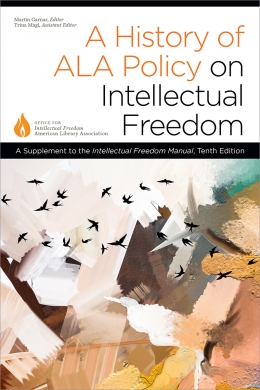
Primary tabs
You don't need to be an ALA Member to purchase from the ALA Store, but you'll be asked to create an online account/profile during the checkout to proceed. This Web Account is for both Members and non-Members.
If you are Tax-Exempt, please verify that your account is currently set up as exempt before placing your order, as our new fulfillment center will need current documentation. Learn how to verify here.
- Description
- Table of Contents
- About the authors
Providing valuable context, this volume presents a range of essays about the history and development of ALA's official documents on intellectual freedom.
Collecting several key documents and policy statements, this supplement to the tenth edition of the Intellectual Freedom Manual traces a history of ALA's commitment to fighting censorship. Beginning with an introductory essay that chronicles ALA policy making on intellectual freedom, this important resource includes sections discussing such foundational issues as
- library advocacy on social and political issues, from post-World War I disarmament, to Vietnam-era protests, to the call to revisit the field’s rhetoric concerning neutrality;
- the evolution of the Library Bill of Rights, such as the 1978 revision that eliminated its use of sex-linked pronouns and ALA Council actions rescinding the 2018 interpretation on meeting rooms;
- protecting the freedom to read;
- diverse collections and equity, diversity, and inclusion, new to this edition;
- ALA’s complicated history on race, including a 1936 statement opposing discrimination, inaction amidst litigation to desegregate libraries in the 1950s and 1960s, and protests over Florida’s Stand Your Ground Law;
- ALA's Code of Ethics;
- how to respond to challenges and concerns about library resources;
- internet filtering, minors and online activity, and education and information literacy;
- programs and displays;
- policy on governmental intimidation;
- copyright; and
- privacy and confidentiality, including the retention of library usage records.
Examination copies are available for instructors who are interested in adopting this title for course use.
Introduction and User’s Guide
Part I: Intellectual Freedom and Libraries
1 ALA and Intellectual Freedom: A History of Policy Making
Part II: Essays on the History of Core
Intellectual Freedom Documents
2 Library Bill of Rights
3 Code of Ethics of the American Library Association
4 The Freedom to Read
5 Libraries: An American Value
Part III: Essays on the History of Interpretations, Guidelines, and Other Statements
6 Interpretations of the Library Bill of Rights and Code of Ethics of the American Library Association
7 Access to Digital Resources and Services
8 Access to Library Resources and Services for Minors
9 Access to Library Resources and Services Regardless of Sex, Gender Identity, Gender Expression, or Sexual Orientation
10 Access to Resources and Services in the School Library
11 Challenged Resources
12 Copyright
13 Creating Policy for Your Library—User Behavior and Library Use
14 Diverse Collections
15 Economic Barriers to Information Access
16 Education and Information Literacy
17 Equity, Diversity, Inclusion
18 Evaluating Library Collections
19 Expurgation of Library Resources
20 Guidelines for Library Policies
21 How to Respond to Challenges and Concerns about Library Resources
22 Intellectual Freedom Principles for Academic Libraries
23 Internet Filtering
24 Labeling Systems
25 Library-Initiated Programs and Displays as a Resource
26 Meeting Rooms
27 Minors and Online Activity
28 Policy on Governmental Intimidation
29 Politics in American Libraries
30 Prisoners’ Right to Read
31 Privacy
32 Rating Systems
33 Religion in American Libraries
34 Resolution on the Retention of Library Usage Records
35 Resolution on Workplace Speech
36 Resolution to Protect Library Confidentiality in Self-Serve Hold Practices
37 Restricted Access to Library Materials
38 Services to People with Disabilities
39 The Universal Right to Free Expression
40 User-Generated Content in Library Discovery Systems
41 User-Initiated Exhibits, Displays, and Bulletin Boards
42 Visual and Performing Arts in Libraries
Subject Index to Essays
Index
Martin Garnar
Martin Garnar is the director of the Amherst College Library. He has taught professional ethics, library instruction, and the foundations of library and information science for the University of Denver’s LIS program. He has served as chair of the ALA’s Intellectual Freedom Committee and the Committee on Professional Ethics and as president of the Freedom to Read Foundation.
Trina Magi
Trina Magi is a library professor and reference and instruction librarian at the University of Vermont. She has chaired state and regional intellectual freedom committees, served on the ALA Intellectual Freedom Committee, and published a number of articles on privacy. She has won several awards for her intellectual freedom advocacy.
Office for Intellectual Freedom (OIF)
ALA's Office for Intellectual Freedom (OIF) is charged with implementing the intellectual freedom policies of the American Library Association through educating librarians and the public about the concept of intellectual freedom as embodied in the Library Bill of Rights, the Association's basic policy on free access to libraries and library materials. In order to meet its educational goals, the Office undertakes information, support, and coordination activities.


